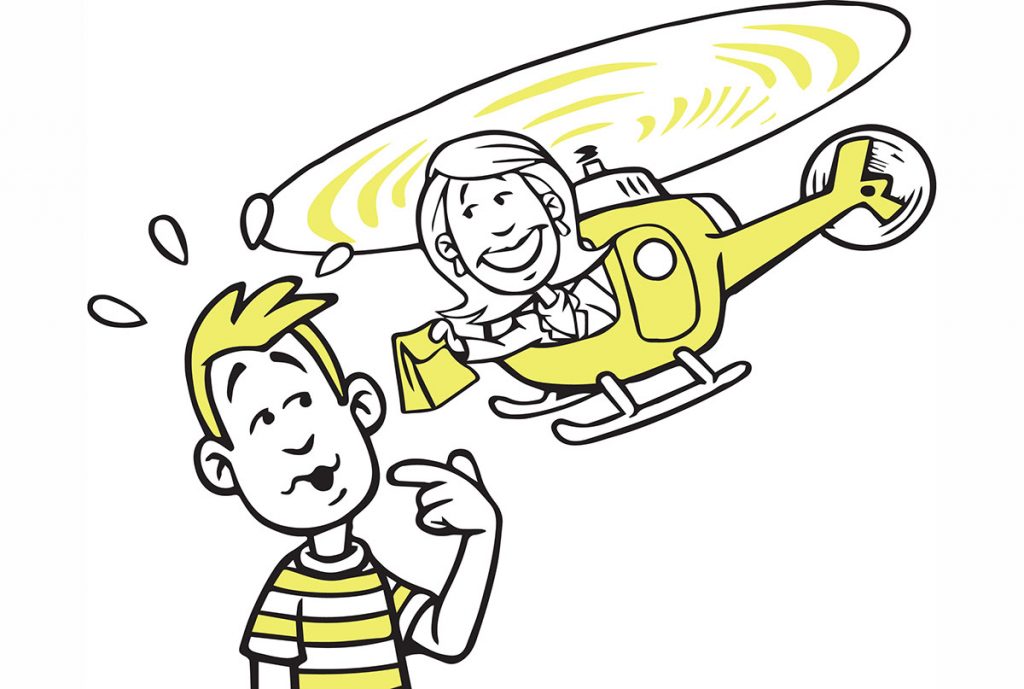Everyone knows at least one helicopter parent (the parent who wraps their child in cotton wool to protect them from the dangers of society and on every aspect of the child’s life.) However, more and more we are seeing the negative consequences of this style of parenting and yet the incidence of helicopter parenting only seems to be increasing.
By Angela Karanja
Monica Rosenfeld, mother of three, who has grown up on the Eastern suburbs of Sydney, is all too familiar with helicopter parents.
“From my observations, parents mollycoddle their children far too much; they don’t give them a sense of responsibility. They transfer their own anxiety to their kids and essentially have them on a leash. My husband and I have encouraged our children to catch buses from a young age, make their own lunches and taught them to be proactive when it comes to communicating with teachers and other students.”
According to adolescent psychologist and parenting teenagers expert, Angela Karanja, helicopter parenting can cross a boundary. “Parents protecting their kids is a natural thing; in fact it is healthy for child development when a parent deeply cares, is interested in the lives of their kids and protects them. However, some parents often cross a boundary, encroach, and enmesh themselves with their kids so much that instead of their presence being a conduit of life, it can become a constrictor of life.”
Angela has provided her top 5 tips for parents to help them be less of a helicopter parent.
1. Find your own identity
The first and healthiest antidote to being a helicopter parent is to find your identity separate from your child. Ask yourself: ‘Who am I without this child’ because most helicopter parents hinge a big chunk of their worth in being parents. What is my sense of purpose without the successes and achievements of the child?
2. Understand their struggles
A major reason why parents result in helicoptering is so that they can protect their kids from experiencing struggles and disappointments. Understanding that struggles are part of life and that they create resilient kids can help parents realise that helicoptering is actually denying their kids from developing the ability to figure out solutions and navigate challenging situations.
3. Release your fear
Helicopter parents can release the fear that their children’s success is wholly dependent on them. Daily sit for a moment and remind yourself of the many processes that happen in your kid’s life in every moment, and you have no influence and control over them. E.g., their heart beating, the blood flowing in their veins, their digestion. When parents take this perspective and scope, they can then begin to trust that indeed their children are a product of life expressing itself, and they do not need that thread combing.
4. Recognise why
Recognise the tendencies that you may be attempting to heal through your kid and compensate for your own feelings of abandonment you experienced as a child. Whilst this may prevent generational neglect, it can start the cycle of disabling independence, create dependency and co-dependency.
5. Adopt the right parenting qualities
Adopt the qualities of a transformational parent; a parent who empowers healthy boundaries, independence, and interdependence. To empower independence, parents can proactively take advantage of technology that facilitates independence while at the same time ensuring the safety of the child. An example of this type of technology is the use of Moochies smartwatches. Moochies is a fully functioning mobile phone in the form of a smart watch with an inbuilt GPS tracking device. Rather than worrying about the location and safety of your child, Moochies allows parents to track their children and contact them through their watch whilst allowing the children to gain independence.

